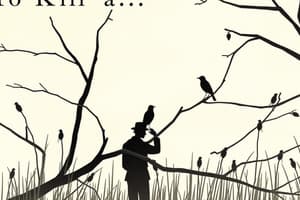Podcast
Questions and Answers
Why does Scout think Atticus is feeble?
Why does Scout think Atticus is feeble?
Scout thinks Atticus is feeble because he is old and doesn't do the things that other dads do.
Who does Scout try to shoot?
Who does Scout try to shoot?
Miss Maudie
Why is it a sin to kill a mockingbird?
Why is it a sin to kill a mockingbird?
It's a sin because the mockingbird doesn't destroy gardens, they just sing and provide music to everyone.
Why does Jem destroy Mrs. Dubose's flowers?
Why does Jem destroy Mrs. Dubose's flowers?
When Atticus states that Mrs. Dubose is a model of real courage, what does he mean?
When Atticus states that Mrs. Dubose is a model of real courage, what does he mean?
What is linin'? Why is it done?
What is linin'? Why is it done?
What does Scout notice about Calpurnia?
What does Scout notice about Calpurnia?
Why does Aunt Alexandra come to visit?
Why does Aunt Alexandra come to visit?
How does Aunt Alexandra explain human behavior?
How does Aunt Alexandra explain human behavior?
Why does Aunt Alexandra want to dismiss Calpurnia?
Why does Aunt Alexandra want to dismiss Calpurnia?
How does Atticus explain rape to Scout?
How does Atticus explain rape to Scout?
Why does Dill run away from home?
Why does Dill run away from home?
Flashcards
Atticus's unique parenting style
Atticus's unique parenting style
Atticus is perceived as different from other fathers because he prioritizes values and a unique parenting approach, separating him from the norm of the community.
What does it mean to 'kill a mockingbird'?
What does it mean to 'kill a mockingbird'?
Killing a mockingbird is seen as a grave sin because they embody innocence and bring joy without harming others, making them symbols of purity and beauty.
Why does Jem destroy Mrs. Dubose's flowers?
Why does Jem destroy Mrs. Dubose's flowers?
Jem's act of destroying Mrs. Dubose's flowers represents his struggle with growing up and dealing with emotional turmoil during adolescence.
What is Atticus's definition of 'true courage'?
What is Atticus's definition of 'true courage'?
Signup and view all the flashcards
What is 'linin'?
What is 'linin'?
Signup and view all the flashcards
How does Calpurnia live a 'dual life'?
How does Calpurnia live a 'dual life'?
Signup and view all the flashcards
Why does Aunt Alexandra visit the Finch family?
Why does Aunt Alexandra visit the Finch family?
Signup and view all the flashcards
What does Aunt Alexandra believe about family influence?
What does Aunt Alexandra believe about family influence?
Signup and view all the flashcards
Why does Aunt Alexandra want to dismiss Calpurnia?
Why does Aunt Alexandra want to dismiss Calpurnia?
Signup and view all the flashcards
How does Atticus define 'rape' to Scout?
How does Atticus define 'rape' to Scout?
Signup and view all the flashcards
Why does Dill run away from home?
Why does Dill run away from home?
Signup and view all the flashcards
Study Notes
Chapter 10: Scout's Perspective on Atticus
- Scout perceives Atticus as feeble due to his age and the lack of typical fatherly activities.
- Atticus's values and approach to parenting set him apart from other fathers in the community.
Chapter 10: Mockingbird Symbolism
- Killing a mockingbird is considered a sin as they bring beauty and joy without causing harm to others.
- This reflects a larger theme of innocence and moral integrity in the narrative.
Chapter 11: Jem's Anger
- Jem destroys Mrs. Dubose's flowers out of frustration as he navigates adolescence and experiences the complexities of life.
- This act symbolizes a tumultuous transition into maturity and the struggle with emotions.
Chapter 11: True Courage
- Atticus refers to Mrs. Dubose as a model of real courage for her battle with addiction, showcasing her resolve to overcome personal demons before her death.
- This highlights themes of strength, morality, and the human experience.
Chapter 12: Linin' Tradition
- Linin' involves one person reciting a line from a hymn followed by the congregation, as a means of enabling participation among those who cannot read.
- This practice reflects the cultural and social dynamics of the community.
Chapter 12: Calpurnia's Dual Life
- Scout discovers that Calpurnia leads a dual existence, balancing her responsibilities at home with her life in the black community.
- This revelation underscores themes of identity and social stratification.
Chapter 13: Aunt Alexandra's Visit
- Aunt Alexandra arrives to provide female influence for Scout and to assume a caretaker role in the household.
- Her traditional views emphasize the expectations placed on women in society.
Chapter 13: Family Influence on Behavior
- Aunt Alexandra believes that family background largely determines human behavior and character, reinforcing the importance of heritage in their community.
- This perspective often creates tension with Atticus's more progressive views.
Chapter 14: Dismissal of Calpurnia
- Aunt Alexandra wants to dismiss Calpurnia, believing that she can manage the household and that Calpurnia's influence is detrimental.
- This disagreement highlights conflicts in parenting philosophies.
Chapter 14: Atticus's Explanation of Rape
- Atticus explains to Scout that rape involves forceful carnal knowledge without consent, providing a stark understanding of the gravity of crime.
- His candidness about such heavy topics portrays his commitment to honest education.
Chapter 14: Dill's Home Situation
- Dill runs away from home due to feelings of neglect and lack of love from his parents.
- This act underscores the themes of loneliness and the search for belonging in the narrative.
Studying That Suits You
Use AI to generate personalized quizzes and flashcards to suit your learning preferences.




